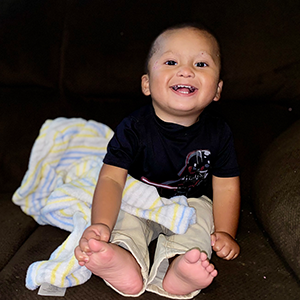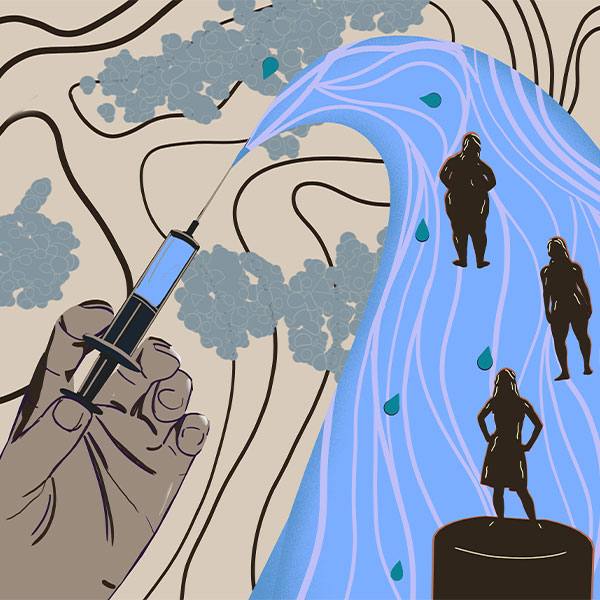-
Pass the turkey — and your family health insights — this Thanksgiving

Thanksgiving Day is also Family Health History Day, an annual national campaign to promote awareness of hereditary health traits in families.
Has your grandmother, mother, aunt or sister had breast or ovarian cancer? Has your grandfather, father or uncle had prostate, breast or pancreatic cancer? Is there a history in your family of colon cancer, diabetes or high cholesterol?
If any of these scenarios resonate within your family, you could also be at risk.
Many hereditary health conditions follow patterns within families, with sometimes as high as a 50% likelihood that if one parent possesses a mutated gene, their child will inherit it. Recent Mayo Clinic research shows that inherited, faulty genes cause more than 10% of all cancers.
"The biggest advice I would give is that if you are with your family this Thanksgiving, spend a few moments to share some of that family health history information. And if a red flag goes up, report that to your doctor. It could actually save someone's life," says John Presutti, D.O., a Mayo Clinic family medicine physician and a researcher at the Mayo Clinic Center for Individualized Medicine.
Predictive power of genomics
Dr. Presutti has integrated genomics into his everyday medical decision-making for his patients, realizing the potential for improving health outcomes.
"If I can help identify patients at high risk for cancer and other diseases, then I can help get them started on screening earlier and avoid the situation of metastatic cancer and early cancer deaths," he says.
Equally important to the discovery of a person's inherited cancer mutation is the potential for them to share the heritable cause of their disease with their blood relatives, allowing family members to pursue care for earlier disease detection and cancer management.
"The power of genetics is that we can potentially foresee the cancer that will develop in other family members," says Niloy Jewel Samadder, M.D., a Mayo Clinic gastroenterologist and cancer geneticist. "This can allow us to target cancer screening to those high-risk individuals and hopefully prevent cancer altogether in the next generation of the family."
Dr. Samadder emphasizes that knowing your family health history can help you, but only if you act on it.
Questions to ask family about health history
- Do you have chronic conditions, such as heart disease or diabetes, high blood pressure or high cholesterol?
- Have you had serious diseases, such as cancer or stroke?
- How old were you when each of these diseases or health conditions was diagnosed?
- What is your family's ancestry? What countries or regions did your ancestors come from?
- What were the causes and ages of death for relatives who have died?
Examples of family health syndromes:
- Hereditary breast and ovarian cancer syndrome is an inherited mutation in the BRCA1 or BRCA2 gene. Along with breast and ovarian cancer, this syndrome also can lead to male breast cancer, pancreatic cancer and prostate cancer.
- Lynch syndrome is a cluster of mutations that can boost the risk of a wide range of cancers, including colon, rectal, endometrial, ovarian, stomach, small intestine, pancreas, kidney, brain, uterus and bile duct.
- Familial hypercholesterolemia is a genetic disorder characterized by high cholesterol, which can lead to premature cardiovascular disease.
Health history situations that raise a red flag
- A person developed cancer at an unusually young age.
- A person has had several different types of cancer.
- Cancer developed in both organs in a set of paired organs, such as both kidneys or both breasts.
- Several first-degree relatives ― parents, siblings or a person's children ― have the same type of cancer. Examples might include a mother, daughter and sisters with breast cancer; multiple family members with breast or ovarian cancer; or family members with colon cancer and endometrial cancer.
- Unusual cases of a specific cancer type, such as breast cancer in a man.
- Being a member of a racial or ethnic group that is known to have an increased risk of having a certain inherited cancer susceptibility syndrome.
- Several family members with cancer.
What to do with the information
If you have a family health history of disease, here are some steps to take:
- Consult a healthcare professional: Schedule a consultation with a doctor or genetic counselor to discuss your family health history and any potential risks.
- Genetic testing: In some cases, your healthcare team may recommend genetic testing to determine whether you have specific genetic mutations or markers associated with hereditary diseases.
- Lifestyle modifications: Make lifestyle changes to reduce risk factors, such as maintaining a healthy diet, staying physically active, and avoiding tobacco and excessive alcohol consumption.
- Communicate: Keep open lines of communication with family members about their health histories, as it can provide valuable insights for everyone's well-being.
Mayo Clinic patients find early detection with genetic screening

Three sisters from Minnesota — Chris, Cindy and Carrie — recently learned they share a genetic mutation known to significantly increase the risk for breast and ovarian cancer. Their BRCA1 variants came to light through a Center for Individualized Medicine's DNA sequencing research study. Read more.

Alejandro Mirazo never imagined his genetic test results would reveal a hereditary link to cancer, or that his findings would potentially save his life. His genetic test results revealed he has Lynch syndrome, an inherited condition that raises a person's lifetime risk of developing colon, uterine, stomach, small bowel, kidney and other cancers. Read more.
Learn more
Read more stories about advances in individualized medicine.
Register to get weekly updates from the Mayo Clinic Center for Individualized Medicine blog.
Join the conversation
For more information, visit Mayo Clinic Center for Individualized Medicine, or Twitter at @MayoClinicCIM.

Related Articles







